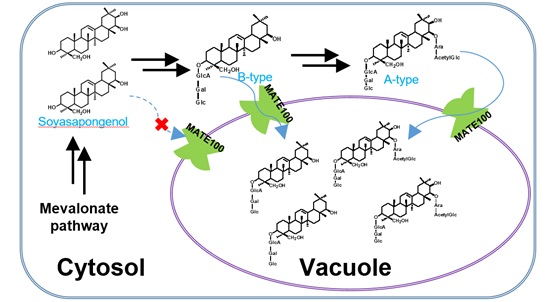Domestic soybeans serve as an important source of healthy edible plant oil and high-quality plant protein in our food culture. In addition to the well-known components of oil (approximately 20%), protein (approximately 40%), and carbohydrates (approximately 30%), soybean seeds also contain a range of specialized metabolites that promote human health. For example, soyasaponins, which make up 0.5-6.5% of the seed, and isoflavonoids, which make up 0.01-0.5%, are critical for promoting human health.
In particular, soyasaponins, which belong to the oleanane-type triterpenes, directly affect the health and flavor quality of soybeans depending on their content and ratio. Currently, although the genes involved in soyasaponin synthesis have been well studied, the genes involved in the accumulation and transport of soyasaponins are largely unknown.
A research team led by Dr. WANG Guodong from Institute of Genetics and Developmental Biology of the Chinese Academy of Sciences (CAS) used gene co-expression analysis to identify GmMATE100 as a candidate gene for soyasaponin transport among 117 members of the Multidrug and Toxic Compound Extrusion (MATE) transporter family in the soybean genome.
Subcellular localization experiments showed that GmMATE100 is localized to the vacuolar membrane in both plant and yeast cells. In vitro yeast transport assays revealed that GmMATE100 has activity in transporting both type A and type B soyasaponins, but is unable to transport the soyasaponin precursor, soyasapogenol.
Using Cas9 technology, they generated GmMATE100 knockout mutants, and LC-MS analysis revealed a significant decrease in the levels of type A and type B soyasaponins in the roots and seeds of the mutant materials compared to the wild type.
Taken together, these results establish GmMATE100 as the first identified soyasaponin transporter responsible for the transport of type A and type B soyasaponins from the cytoplasm to the vacuole. This study provides a new avenue for targeted modification of soyasaponin content and composition in soybean seeds to improve soybean health and taste quality.
GmMATE100 is involved in the soyasaponin transport form the cytosol into the vacuole in soybean plants. (Image by IGDB)





